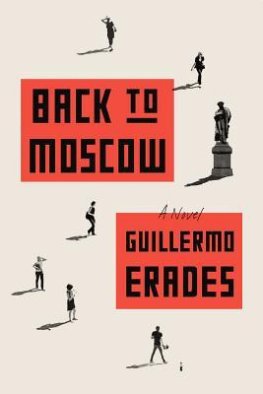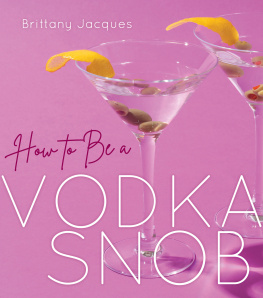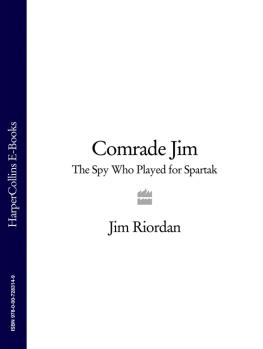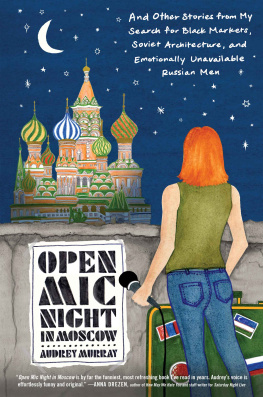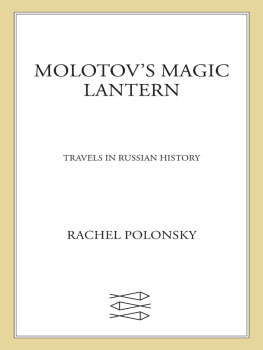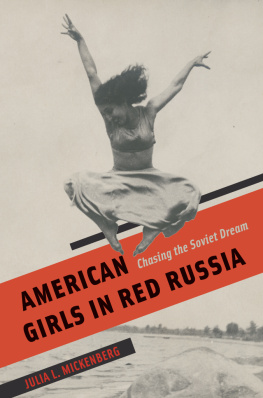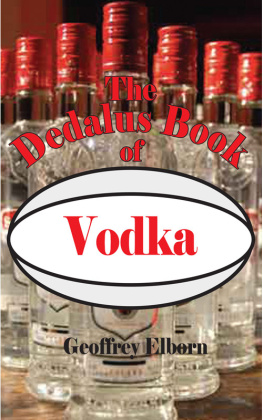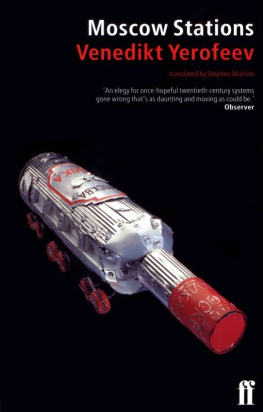Guillermo Erades
Back to Moscow
Olga: (.) I feel how every day my strength and my youth are leaving me, drop by drop. Only one dream grows and gets stronger.
Irina: To go back to Moscow. To sell the house, to finish everything here, and to Moscow.
Olga: Yes! As soon as possible, to Moscow.
Anton Chekhov, Three Sisters
FIRST I NOTICED THE cockroaches. Smaller, quicker. Every time the lights went on, I glimpsed their glossy mahogany shells darting across the floor. They were called tarakany and, perhaps because I liked the word, I felt no hostility towards them. They roamed freely around my room, enjoying the darkness beneath the rusty cot, crawling up the cracked walls, onto the desk totally unconcerned by my presence.
Other than the cockroaches, Sektor E was deserted. On my first night Id ventured into the maze of corridors hoping to bump into other international students. To my disappointment, Id heard nothing but the creaking of the wooden floors under my feet. Id located the communal kitchen, strewn with empty vodka bottles and crushed beer cans. The fridges were stocked with a wide selection of used ketchup and rancid milk, courtesy of the language students who had fled the university at the end of summer, just before my arrival.
With nothing else to do, every night I would go for dinner at the sixth-floor bufet. The bufet was always empty and smelled, like the rest of the university building, of rotten wood and disinfectant. I would sit at the corner table, trying to read a bit of Chekhov, the greasy plastic tablecloth sticking to my elbows. On each table stood a glass bud vase with a single red flower. They were made of plastic, these flowers, but for some reason the vases always contained water.
As soon as I opened my book, a chubby lady with bleached hair and heavy make-up would storm in from the kitchen, slap the menu on the table and wait, hands on hips, for my order her beefy body exuding a kind of impatience and irritation I was, in those early days, unaccustomed to.
The menu in front of me, a simple sheet of paper, bore a short list of dishes handwritten in Cyrillic. To my despair, I was unable to identify the different letters, let alone understand the meaning of the words. Nor could I rely on the ladys assistance she had made it clear during our first encounter that it was not her job to make any particular effort to communicate with me, her only evening customer and yet a stupid nekulturniy foreigner.
Undeterred, I would stare for a few seconds at the menu, nodding slightly, as if to indicate that I somehow understood what was written on the paper, that I was indeed considering the different choices.
Soup, I would say, every night, but Id pronounce the word in a guttural way, making it sound, at least to my ears, more local.
So it was soup every night, with Chekhov as my dinner companion.
Now, when I look back at those uneventful nights, I feel a soft wave of nostalgia washing through my chest. So treacherous is the nature of memory that I cant fully evoke the boredom, sadness and disappointment I surely felt back then. What I recall when I picture my younger self reading the short stories of Anton Pavlovich in an empty canteen, is a sweet sense of tranquillity which, in truth, I might have not felt at the time. Im aware that its only from the vantage point of years passed that I now see those days as the calm prelude to the life I was sucked into and to the tragic events that ended it.
One Tuesday night, two weeks after my arrival, I went for dinner later than usual and found two other international students at the bufet. They were chatting in English over the remains of dinner and cups of instant coffee. By their accents I guessed that the one who did most of the talking was American the other one Latin American, perhaps Spanish. They wore well-ironed shirts, hair gel, cologne.
I pretended to read my Chekhov book, excited but unsure about how best to approach them, not wanting to look desperate or lonely. I waited patiently for a pause in their conversation and, adopting as casual a tone as I could muster, I jumped in.
You guys going out tonight?
Sure, the American said. Tuesday. Ladies night at the Duck.
The Duck?
Man, you dont know the Hungry Duck?
Im afraid not, I said.
How long have you been here?
Two weeks.
And thats how I met Colin.
I put Chekhov aside and joined their table.
An hour later, the three of us were heading towards the city centre in a battered zhiguli wed hailed outside the university. Colin sat in the front seat, chatting to the driver, giving directions. I couldnt understand what he was saying but I could see he knew his way around. Diego, who turned out to be Mexican, sat in the back, telling me how he had arrived in town, just a few months earlier, to study engineering. He had managed to score a little-known scholarship for Latin American students, he was saying, not too generous but enough to get by as long as he lived in the university residence. Awesome place, Diego said, pointing to the dark city. Youre going to love it.
Following Colins instructions, the driver pulled over by a small produkty shop where we bought a bottle of Stolichnaya and a few plastic glasses. Then the zhiguli drove through avenues five or six lanes wide, crossed the river, and passed beneath hanging traffic lights, which seemed to work but were largely ignored by the driver.
The zhiguli dropped us next to a metro stop. By foot we continued through a covered alley into a dark parking lot. We arrived at a poorly lit door and joined a group of young guys waiting in the cold.
Vodka time! Colin opened the Stolichnaya bottle and filled our plastic goblets. To the Duck, he said, half smiling, best club on Earth.
Colins half-smile, I later learned, was a permanent facial feature, not meant to convey any particular emotion; every time he talked, the half-smile made him look as if he knew more than he was willing to share.
We drank up. The vodka warmed my throat. My stomach burned and shivered: the thirsty little Cossack inside me, expecting another quiet Chekhov night, had been caught by surprise.
More people arrived and joined the queue, bouncing on their feet to keep warm. As far as I could tell, they were all guys, all expats, all about our age.
After pouring more vodka into our plastic glasses, Colin grabbed my shoulder and said, Believe me, man, there is no better place to be young, foreign and male. I couldnt tell if he was talking about the club or the city, but I agreed with a wide smile.
I glanced at other guys in the queue. They were drinking, smoking, chatting. I couldnt stop smiling and they returned the smile, with little nods. By the time we were done with the bottle of vodka, I felt an unspoken but strong connection among all of us in the queue a sense of camaraderie and shared anticipation.
Suddenly I was no longer thinking about Katya or Amsterdam. The thirsty little Cossack was cheerful: up on his horse, rattling his sabre, ready for battle.
At eleven sharp the door of the club was opened from the inside and I found myself carried through the entrance by an all-male stampede. I was pushed into a corridor lined with mirrors, where some of the guys hurriedly retouched their hair, and there was a booth where we paid the cover and a cloakroom where we dropped our jackets.
At the far end of the bright corridor, a black metal door throbbed with loud music. As we approached, my heart pumping fast, I was taken aback by the stench of spilt beer and vomit. I held my breath.
Colin pulled the door and beckoned me in. Welcome to the Duck.

